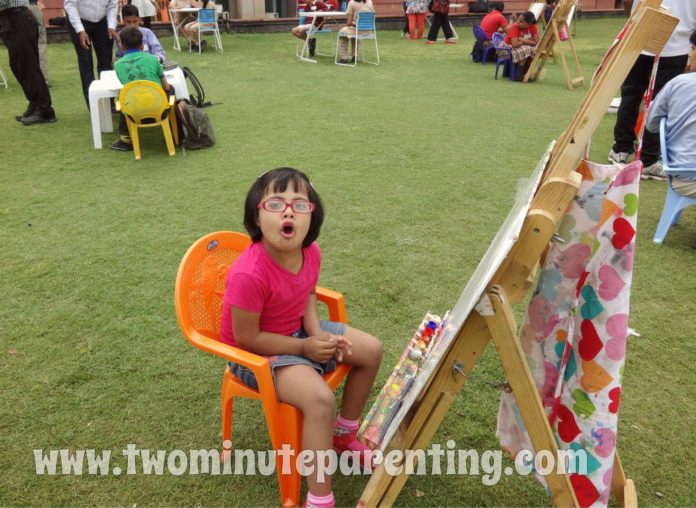Yesterday, I was invited to speak at National Conference On Down Syndrome. It was not just an honour but was an opportunity for me to address my fellow parents and professionals about the existing perceptions and expanding it by working hard.
Wanted to share with you all the speech that I gave. The topic of my presentation was ‘Changing the perception of children with Down Syndrome’
The transcript of my speech.
Today I want to talk about perceptions and how it can adversely affect our community and overall the possible achievements of our children.
‘Perception is the way in which something is regarded, understood or interpreted’ and my case today would be about the same, in the context of our children.
I want to ask a question to all the mothers here. When you received the diagnosis and tried to find out about Down syndrome and what it was, were the images you saw encouraging? Or did they take you further away from acceptance?
From 40 years ago to today, in spite of our children’s potential and achievements we have not been able to change the popular perception and imagery that is associated with Down syndrome. We have not been able to change the popular narrative that defines our children into three broad adjectives. Someone who is ‘always happy’ ‘ hugs everyone’ and ‘who loves to dance’ and who is ‘basically stupid… I am sorry to use this word but I am talking about perceptions and this is surely the one that society thinks for them.
There are other cliches like incomprehensible speech, tongue always out, ‘never independent’..but you get the gist.
Now before I go ahead I’d like to show you three short clips
Do these people look different than the perception you had about Down syndrome? ….Why do you think these children are different than popular perceptions? Do they have less Down syndrome than others as popularly believed or is it because they had someone who ferociously believed in them and not in the popular imagery?
I am not celebrating success stories here. There are thousands if not millions of people with DS who are doing and achieving what was never considered possible.
What I am trying to communicate is that our children are much more capable than what we have been told till now and this negative perception about their abilities is affecting their learning, education and future.
Our children are not just about dancing or looking cute ( of course they excel at both. There is a need to have a paradigm shift in the way this popular narrative about our children is built and presented and to change it we need to start now. Which brings me to my first point.
Perception of professionals
In the last 10 years, almost every doctor that We’ve ever met…had one advice to give us..’ Concentrate on her dance’…these children are good at music and dance! And I kept wondering…who are ‘these children’… my daughter loves to dance but she also loves to read, write, skate, and play badminton but no one advised me on that.
A couple’s journey as special needs parents starts from the doctor’s office. The doctor is their first or sole point of contact, their only hope and these parents weigh, watch, measure and hang on to every single word that comes out of the mouths of these earthly Gods.
How the news is delivered can make or break the next few years of parents and also the early intervention of the child. A depressed parent isn’t the best parent.
Just like the UK’s ‘Tell it Right’ program and locally in Chennai, more protocols should be established for breaking the news. Even after that the whole army of doctors that a parent might get in contact with like pediatric cardiologists, surgeons, ophthalmologists, endocrinologists, pediatricians, geneticists, and psychologists..everyone should have a protocol to follow which should not be based on their subjective pre-conceived notions.
In the last 10 years, almost every doctor that I’ve ever met…had one advice to give me..’ Concentrate on her dance’…these children are good in music and dance! And I kept wondering…who are ‘these children’
Next are teachers, who then help create perceptions among thousands of vulnerable minds about disability. They are a crucial link and there is a dire need to sensitise them with awareness to create better perceptions in society.
Also read: Dear Doctor, Get Sensitive Or Get Out – A Special Needs Mother
After doctors and teachers, I can think of people in government offices, at public dealing places and how should be trained on treating people right and be aware of their challenges and also their abilities.
The people in positions of influence should show hope and not sorrow and they are needed to do it now like never before.
The next point is for parents
Assuming competence

It could be a child with high sensory needs and visual challenges, or a child with low muscle tone with no depth perception or it could also be the one who is able to do almost everything but is non-verbal.
The one thing that can change each one of these kids’ future and the collective perception of our children is us ‘Assuming competence’ in their abilities!
Assume that he is capable of more. Whatever you are seeing around you are old theories. Your child is unique. Create your own reality. If one thing doesn’t work try another, if one program fails, find another one but keep moving.
One thing that may change your and your child’s life is ‘Stimulation’ and ‘repetition’
Shift the goalpost!
Expect a little more, do a little more…
Don’t have a set notion or image of what your child can or cannot do – that’s the biggest hurdle because that image you have in your mind Is not your own. It has been contributed by Media and age old beliefs and that may not be true in today’s time and age.
‘Assume your child can and he will’
Taking charge

“Somebody has rightly said,’ Either you run the life or the life runs you”
Taking charge. You’ve got the diagnosis. You’ve cried for months, gone through the denial, the guilt, the anger phase…now move on…Take control of your situation. You are the person who can change the destiny of your child. Research, learn, teach, train. Expect them to do more than what you’ve been told.
Stop treating them like babies. Treat them as per their age, and stop believing anyone who says our children should only speak one language..I know many who speak three… expose them to situations to people to places.
Stop asking only yes-no questions. Engage in high-order thinking questions.
Teach social skills. Socially appropriate behaviour, don’t blame everything on Down syndrome. Many things can be blamed on poor parenting. Learn the difference and move on to the next thing. Make them part of conversations, outings, family events, and critical discussions. Empower them with communication (verbal or non-verbal) and help them get better at it. Teach manners and establish negotiable and non-negotiable ground rules. In one sentence, take charge of your situation.
Seeking guidance
About 10 days ago, we were worried that Aarshia was losing interest in skating. She was making excuses and was not interested in continuing. We spoke to the coach and he suggested we change the wheels. Even though we had changed them less than 20 days ago. we again did…to what the coach suggested…and something extraordinary happened …
We suddenly had a new girl who was ready an hour before class and didn’t want to come back. She’s now practicing two hours instead of one and her passion was reinstated.
This incident became a lightbulb moment for me. I wondered how many times we as parents blame it on the abilities and competence of the child and not the programmes and methods with which we are teaching. Not looking for better alternatives.
We are a huge population across the globe. And many parents and professionals are creating platforms, and networks that make it easier for us to seek their guidance. Use that. The Internet has made it so easy to ask questions from someone sitting in another continent.
There are Down syndrome research institutes, writing, reading, and learning programs and many more resources that are out there in the world for you to seek.
What is accessible now was not easily available when we started. So the chances of better potential by the day.
You don’t need to do all but you can always take trials, speak to people who’ve done those and then make an informed decision.
Read Glenn Doman’s books, read about neuroplasticity. Be aware. Understand that ‘An aware parent is the empowered one’
Challenge and expand the narrative

The Internet is filled with photos of children with DS with sappy captions. Talent shows with our children dancing to the ‘Taare Zameen Pa’ song and judges and anchors crying.
In our quest to create awareness, we somehow have started reinforcing the very stereotypes we have been fighting.
More often than not our children are shown not for who they are but for what emotions they can evoke in the general population and it is not of inclusion or equality – it is almost always of sympathy and pity.
This is why we as parents should be careful with the message that we are sending in the world.
40 years ago in the era of institutionalization, nobody would’ve imagined all that our children are achieving today. the reality or the narrative has changed from then but it further needs to be changed and should shift from sympathy to equality.
In the end all I’d like to tell each parent here is to do one exercise when you go home. Keep your hand on your heart and imagine the future you’ve already thought for your child. Once you have that image…take an invisible eraser wipe that image off and build another one. One that is powerful and one that defines him as the best.
Thank you






